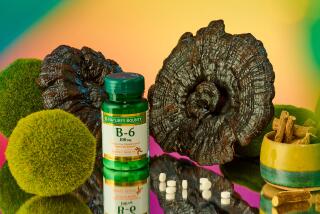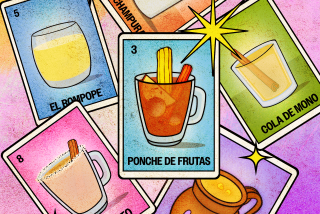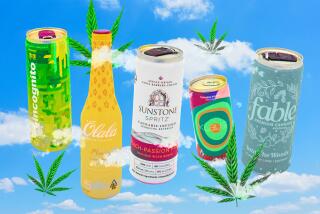Amazonian Berry May Find New Worlds to Conquer : Guarana: Used in tablets and teas, the caffeinated fruit has long been cherished in Brazil. Now the U.S. soft-drink market beckons.
- Share via
SAO PAULO — Amazonian tribesmen use it as a love potion. Sao Paulo stock brokers swear by its capacity to stimulate. Members of Brazil’s championship World Cup team use it to quench their thirst before big games.
The bright-red Amazonian guarana berry is a caffeinated tropical fruit that Brazilians have long consumed in tablets and teas. Carbonated guarana drinks have been made in Brazil for almost eight decades by Cia. Cervejaria Brahma.
Now, as some Brazilian soft drink makers eye the potential U.S. market, giants PepsiCo Inc. and Coca-Cola Co. are getting into the act. Pepsi recently launched a guarana-based drink for U.S. consumers and Coke is marketing a version in Brazil.
“Guarana sure does pack a punch,” said Pepsi spokesman Brad Shaw, “and it’s also full of mystery and mystique.”
Pepsi concluded a test run of a guarana drink called Josta among East Coast consumers last month, and is debating a wider launch for the product, Shaw said. A watered-down version of its Brazilian relatives, Josta has about the same amount of caffeine as another popular Pepsi drink, Mountain Dew.
“We’re not telling Josta drinkers that guarana is considered an aphrodisiac by some Brazilians,” Shaw said, “but we did say it comes from the depths of the rain forest where Indian tribes say it has the power to force water from clouds.”
Beverage companies are betting the fruit’s mysterious appeal will catch on outside Brazil, where guarana drinks now account for about 22% of the $3-billion domestic soft drink market, said Enrique Figueroa, an analyst at James Capel Inc.
Already a leading beverage company, Cia. Antartica Paulista, and Sao Paulo-based Banco Real de Investimentos SA are selling guarana-based drinks in the United States.
Banco Real is an investment banking firm that last year set up an American unit, IBI Beverage Inc., based in White Plains, N.Y., to market a guarana drink called Samba. So far, IBI sells Samba in New Jersey, Arizona and Oregon.
Guarana’s appeal is nothing new in Brazil, where Brahma, one of the country’s most successful brewers of beer, sold its first bottle of carbonated guarana in 1918.
“Since then, it’s been our pack leader among soft drinks,” said company spokeswoman Fernanda Delmas. Brahma, which also sells tonic water and a lemon-lime soda, doesn’t make cola.
Brahma’s Guarana had 3% of Brazil’s soft-drink market in February, according to a study by the Brazilian unit of the research firm of A.C. Nielsen. Seeking to boost its market share, Brahma recently redesigned the packaging of its guarana drink, gradually replacing its plump, brown glass bottle with a sleeker, plastic, family-style container.
“We wanted a more contemporary look for our guarana, something more in tune for today’s young family,” Delmas said.
*
Brahma, which has 46% of the Brazilian beer market, last year began exporting its beer to neighbors Argentina and Venezuela. The company is Brazil’s largest brewer, according to a March report by James Capel Inc.
“There’s a possibility in the future that we might use our distribution network in those countries to start exporting guarana,” said Delmas.
Before the potent guarana was packaged and sold in Brazil, it was praised by adventurers and anthropologists who had come upon it in the Amazon, where indigenous tribes ate it as a paste.
In its native form, guarana has 2 1/2 times as much caffeine as a coffee bean has, said Deborah Falk, an advertising executive marketing Samba.
Myths from the region describe the plant from which guarana blossoms and becomes fruit as a panacea, a substance promoting sexual vitality and physical strength.
Cia. Antartica Paulista, a Sao Paulo-based brewery founded in 1885, sells Brazil’s most popular guarana drink, Guarana Champagne. The company has 70% of the non-cola market for soft drinks in Brazil.
Last year, Antartica opened shop in the United States. “We’re betting Americans will love guarana the same way Brazilians do,” said Carlos Smith, director of marketing for the Miami-based Cap Beverage Inc. formed by Antartica.
Antartica imports guarana concentrate from Brazil and produces the drink at bottlers in Florida and Louisiana. So far, the beverage is being sold in California, Florida, Texas and Georgia. Smith declined to provide sales figures.
Antartica’s guarana will compete with IBI’s Samba, which already comes in four flavors: raspberry, papaya, mango-guava and original guarana.
“This tiny red berry, though little known to the rest of the world, has been one of the treasures of Brazil since antiquity,” said Rogerio Freitas, IBI’s executive vice president.
More to Read
Sign up for Essential California
The most important California stories and recommendations in your inbox every morning.
You may occasionally receive promotional content from the Los Angeles Times.












